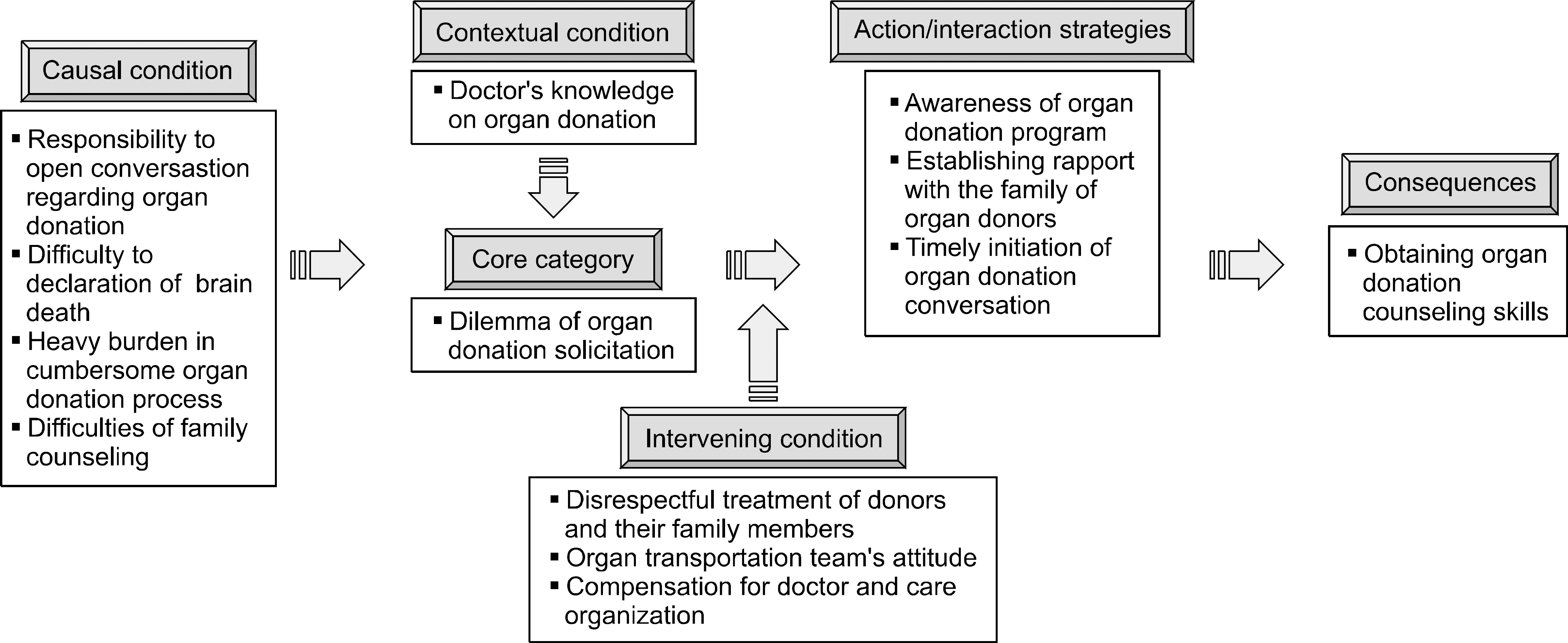Abstract
Background:
The purpose of this study was to identify the attitude of physicians stemming from their experiences of caring for potential brain death donors during the organ donation process.
Methods:
Grounded theory methodology was used for this study. In depth interviews were conducted with six physicians who had experience of management of potential brain death donors. Data collection was done from January to October 2011. Theoretical sampling was used until the data reached saturation.
REFERENCES
1). Park YJ, Kang H, Kim EM, Shin WY, Yi NJ, Suh KS, et al. Establishment of active identification and management system for potential brain dead donors in life-link center. J Korean Soc Transplant. 2009; 23:43–51. (박양진, 강현진, 김은만, 신우영, 이남준, 서경석, 등. 생명 연결본부: 능동적인 잠재뇌사자 발굴신고 및 뇌사장기기증자 관리체계 구축. 대한이식학회지 2009;23:43-51.).
2). Park SJ, Yoon YC, Cho WH, Roels L, Smits J, Cohen B, et al. Preliminary results of donor action in Korea. J Korean Soc Transplant. 2012; 26:101–11. (박석주, 윤영철, 조원현, Roels L, Smits J, Cohen B, 등. Donor Action Program의 한국 내 적용을 위한 기반조성 연구. 대한이식학회지 2012;26:101-11.).

3). Lee WH, Moon OR, Kwak JY. A study on the analysis of relative factors of intensive care unit nurses' attitude in brain death organ donation. J Korean Soc Transplant. 2001; 15:217–24. (이원희, 곽진영, 문옥륜. 뇌사자 장기기증에 관한 중환자실 간호사의 태도에 영향을 미치는 요인 분석 연구. 대한이식학회지 2001;15:217-24.).
4). Kang KJ, Kim SH. Nurse's knowledge and attitudes on organ donation in brain death. J Korean Soc Transplant. 2004; 18:81–6. (강경자, 김상희. 뇌사자 장기기증에 대한 간호사의 지식과 태도. 대한이식학회지 2004;18:81-6.).
5). Hwangbo HM. A study on factors influencing families consent for donation of solid organs for transplantation [master’s thesis]. Seoul, KR: Seoul National University;2004. (황보혜민. 뇌사자 가족의 장기기증 동의에 영향을 미치는 요인 조사 연구 (석사학위논문). 서울: 서울대학교 보건대학원; 2004.).
6). Sung MH, Son EY, Lee SE. A study on knowledge and attitude of nurses regarding brain death organ donation. Clin Nurs Res. 2006; 12:125–35. (성미혜, 손은영, 이상은. 임상간호사의 뇌사자 장기기증에 관한 지식과 태도. 임상간호연구 2006;12:125-35.).
7). Lee JA, Kim SY. The knowledge and attitude of medical students towards the organ donation. J Korean Soc Transplant. 2008; 22:120–9. (이진아, 김소윤. 뇌사자 장기기증에 대한 의과대학생의 지식과 태도 연구. 대한이식학회지 2008;22:120-9.).
8). Choi JA. A study on the analysis of organ transplant coordinator's attitude in brain death organ [master’s thesis]. Seoul, KR: Yonsei University;2009. (최정아. 뇌사자 장기기증에 대한 장기이식 코디네이터의 태도 분석 (석사학위논문). 서울: 연세대학교 보건대학원; 2009.).
9). You HS. The effect of brain death organ donation educa-tion on nurses' knowledge and attitude. Clin Nurs Res. 2009; 15:57–65. (유혜숙. 뇌사 장기기증 교육이 간호사의 뇌사 장기기증에 대한 지식과 태도에 미치는 효과. 임상간호연구 2009;15:57-65.).
10). Jung WJ. Knowledge and attitudes of Busan citizens towards brain death, organ donation and transplantation [master’s thesis]. Busan, KR: Catholic University of Pusan;2010. (정웅재. 뇌사, 장기기증 및 장기이식에 대한 부산시민의 지식과 태도 (석사학위논문). 부산: 부산가톨릭대학교 생명과학대학원; 2010.).
11). Ha HS, Hong JJ, Kim SC, Lee SG, Song MG, Han DJ. Study on physician's perceptions and attitudes on organ donation in brain dead donors. J Korean Soc Transplant. 2001; 15:51–7. (하희선, 홍정자, 김송철, 이승규, 송명근, 한덕종. 뇌사자 장기기증에 대한 담당의사의 관심 및 태도 조사 연구. 대한이식학회지 2001;15:51-7.).
12). Oh MS. A survey on the perceptions and attitudes of public and medical professionals on organ transplantation. Seoul, KR: Research & research;2009. (오민수. 장기기증에 대한 일반국민 및 의료인 인식조사 보고서. 서울: Research & research; 2009.).
13). Strauss AL, Corbin JM. Basics of qualitative research: techniques and procedures for developing grounded theory. 2nd ed.Thousand Oaks, US: Sage Publications;1998.
14). Lincoln YS, Guba EG. Naturalistic inquiry. Beverly Hills, CA: Sage Publications. 1985.
15). Shafer TJ, Ehrle RN, Davis KD, Durand RE, Holtzman SM, Van Buren CT, et al. Increasing organ recovery from level I trauma centers: the in-house coordinator intervention. Prog Transplant. 2004; 14:250–63.

16). Jelinek GA, Marck CH, Weiland TJ, Neate SL, Hickey BB. Organ and tissue donation-related attitudes, educa-tion and practices of emergency department clinicians in Australia. Emerg Med Australas. 2012; 24:244–50.

17). Marck CH, Weiland TJ, Neate SL, Hickey BB, Jelinek GA. Australian emergency doctors' and nurses' acceptance and knowledge regarding brain death: a national survey. Clin Transplant. 2012; 26:E254–60.





 PDF
PDF ePub
ePub Citation
Citation Print
Print



 XML Download
XML Download